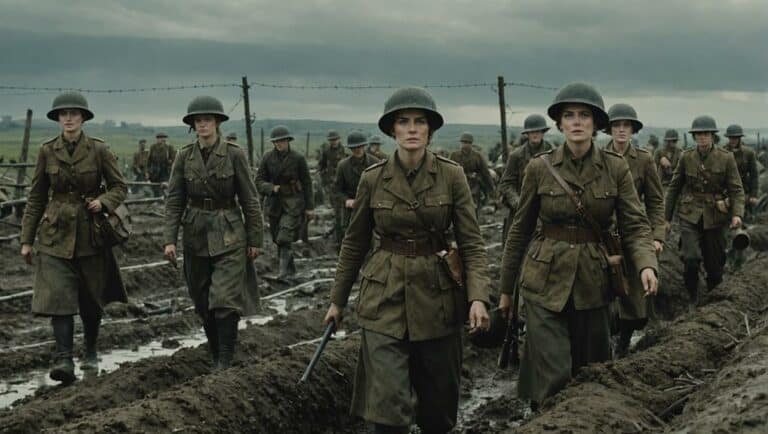Discover the untold stories of extraordinary heroism as women like Elizabeth Knocker, Mairi Chisholm, and others showcased unparalleled bravery and skill in the trenches of WWI.
Their courage and dedication not only saved countless lives but also fundamentally reshaped wartime roles, leaving an indelible mark on history.
Elizabeth Knocker and Mairi Chisholm
Frequently hailed as heroines, Elizabeth Knocker and Mairi Chisholm's decision to establish a First Aid Post near the Belgian front line in 1914 marked a pivotal moment in World War I medical history. Their unwavering belief in treating wounded soldiers as close to the front line as possible was both revolutionary and perilous. By bringing medical care to the very edge of battle, they saved countless lives that might've been lost during the arduous journey to distant hospitals.
Operating under constant threat, Knocker and Chisholm's bravery didn't go unnoticed. In 1915, they were awarded the Belgian Order of Leopold for their exceptional courage and dedication. Their efforts were further recognized in 1917 with the British Military Medal. These accolades highlight the profound impact they'd in a time when women's contributions were often overlooked.
Their commitment came at a significant personal cost. Both women endured the harrowing conditions of war, including being badly gassed in 1918. Despite these challenges, their First Aid Post remained a beacon of hope for injured soldiers.
The legacy of Elizabeth Knocker and Mairi Chisholm underscores the essential role of frontline medical care in wartime and the extraordinary courage of those who provide it.
Marguerite Maud McArthur
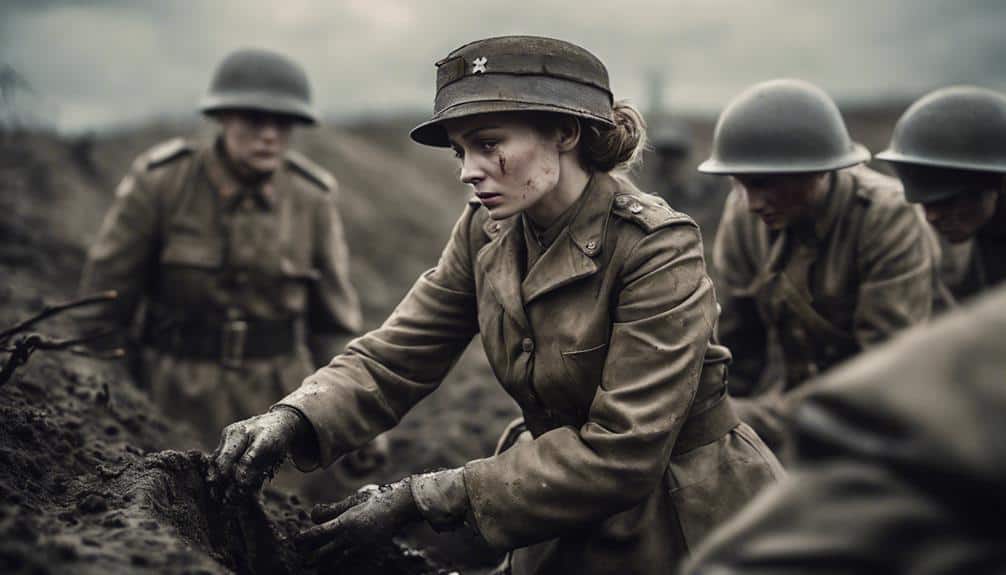
Marguerite Maud McArthur's exceptional command of French and German allowed her to make significant contributions in the War Office Translation Bureau and Army Educational Service during WWI.
Despite her critical role, her life was tragically cut short by pneumonia in 1919, ending her service in Etaples, France.
Her legacy, commemorated through a book by a friend, highlights both her linguistic talents and the harsh realities faced by women in wartime.
Language Skills Utilized Effectively
McArthur's exceptional proficiency in French and German proved crucial during WWI, enabling her to bridge important communication gaps and support military operations effectively. As one of the many women who took on critical wartime roles, her language skills became a linchpin in the First World War's complex communication network.
Employed by the YMCA, McArthur's abilities were instrumental in facilitating clear and precise exchanges between English-speaking soldiers and their French and German counterparts.
Her work didn't stop there. McArthur's linguistic talents were further harnessed by the War Office Translation Bureau and the Army Educational Service. These roles required an acute understanding of nuanced military terminology and the ability to convey intricate details accurately. Her contributions ensured that crucial information flowed seamlessly, preventing misunderstandings that could have had dire consequences.
McArthur's story underscores the indispensable role of women in wartime efforts, particularly those with specialized language skills. By effectively supporting communication and educational tasks, she exemplified how linguistic abilities can greatly enhance military operations.
Her dedication and expertise provided critical support, highlighting the often-overlooked contributions of women in the trenches of WWI.
Pneumonia's Tragic End
Despite her priceless contributions to the war effort through her language skills, Marguerite Maud McArthur's life was tragically cut short by pneumonia in 1919 while stationed at Etaples, France. Her untimely death cast a shadow over the significant work she accomplished during World War I. Employed by the YMCA, McArthur's expertise was crucial to the War Office Translation Bureau and the Army Educational Service. Her talents ensured that critical information was communicated effectively, aiding the war effort in ways often overlooked.
Her final resting place remains a poignant reminder of her sacrifice. Legacy commemorated in literature: A friend published a book in 1920 to honor her contributions and life. Symbol of non-combat sacrifices: Her story highlights the unseen challenges faced by women in supportive roles.
McArthur's death from pneumonia underscores the harsh conditions even non-combatants endured. The Etaples Military Cemetery where she lies is a tribute to her dedication. Her story isn't just about her tragic end but also reflects the broader narrative of women's indispensable yet often forgotten roles in wartime. Understanding her contributions offers a more detailed picture of the sacrifices made during the Great War.
Mary O'Connell Bianconi
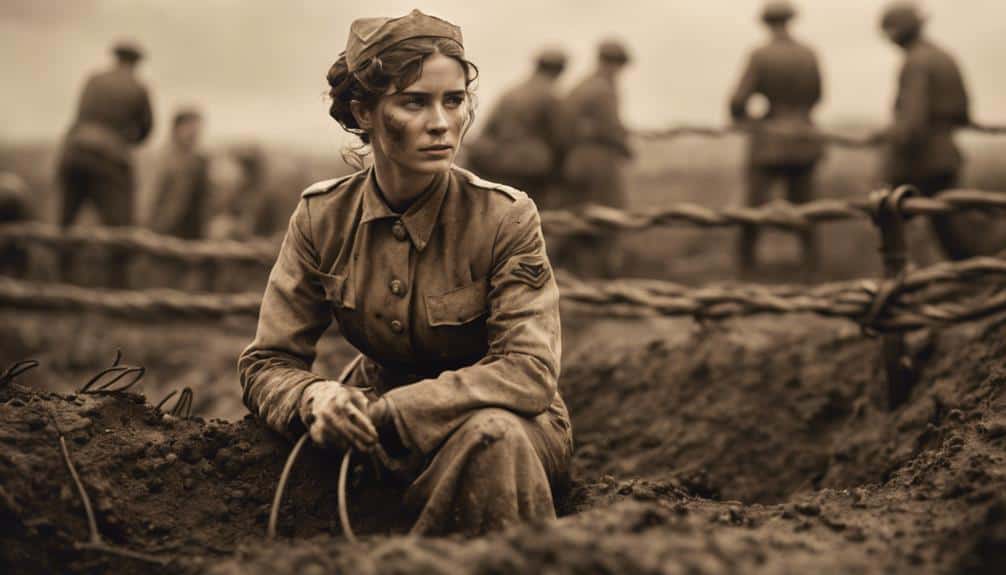
You can't overlook the incredible bravery Mary O'Connell Bianconi exhibited during her time with FANY in France.
As a driver in the St Omer Ambulance Convoy, she not only navigated treacherous roads but also risked her life under fire to save wounded soldiers.
Her actions during an air raid in July 1918, which earned her the Military Medal, underscore her unwavering courage and dedication.
Bravery During Air Raids
Amidst the harrowing chaos of air raids in July 1918, Mary O'Connell Bianconi's fearless dedication to assisting wounded soldiers in St Omer Ambulance Convoy exemplified the extraordinary bravery of women on the front lines during WWI. As bombs rained down, Mary navigated the devastation with a singular focus: saving lives. Her actions during these perilous moments were nothing short of heroic.
- Bravery under fire: Mary's courage in the face of air raids was recognized when she received the Military Medal.
- Life-saving efforts: She worked tirelessly in caves, dugouts, and hospitals, often risking her own safety to tend to the injured.
- Front-line dedication: Her commitment highlighted the essential role women played in wartime, often overlooked in historical narratives.
Mary O'Connell Bianconi's heroic efforts during these air raids were instrumental in providing critical medical care. Her unwavering bravery showcased the indispensable contributions of women on the front lines, challenging traditional wartime roles. By risking her life, Mary not only saved countless soldiers but also paved the way for future generations to recognize the crucial impact of women in war.
Understanding her story enriches our appreciation of the multifaceted courage displayed during such tumultuous times.
Driving Ambulance Convoys
Driving ambulance convoys during World War I, Mary O'Connell Bianconi's relentless determination and skillful navigation through war-torn landscapes provided life-saving medical transport for countless wounded soldiers under the direst conditions. As a dedicated member of the First Aid Nursing Yeomanry (FANY), she served in the St Omer Ambulance Convoy, a critical lifeline on the front lines.
Mary's role demanded not just driving expertise but immense bravery. She navigated treacherous terrain, dodged enemy fire, and transported the gravely injured to safety. Her exceptional service was recognized with the Military Medal for her courageous actions during an air raid in July 1918. This accolade underscored the crucial contributions made by female ambulance drivers, who often risked their lives under relentless bombardment.
The St Omer Ambulance Convoy, where Mary operated, was pivotal in the broader war effort. It showcased the indispensable role of women in the trenches, providing urgent medical support. Amid caves, dugouts, and makeshift hospitals, Mary O'Connell Bianconi exemplified the resilience and commitment of women who served. Her actions not only saved lives but also paved the way for greater recognition of women's contributions in wartime.
Saving Lives Under Fire
Mary O'Connell Bianconi's unwavering courage shone through every perilous moment she spent maneuvering the chaos of the battlefield, rescuing wounded soldiers under relentless enemy fire. As an ambulance driver for the St Omer Ambulance Convoy during World War I, her bravery was unmatched. Women served on the front lines, and Mary's actions were a poignant attestation to their resilience and dedication to saving lives.
- Military Medal for bravery: Mary was honored with this prestigious award after assisting wounded soldiers during a harrowing air raid in July 1918.
- Risking her life: She operated in caves, dugouts, and hospitals, epitomizing selflessness and commitment.
- Impactful service: Her efforts notably boosted the morale and survival chances of countless soldiers.
Mary's story illuminates how women served essential roles in World War I, often underappreciated but incredibly crucial. Her work as an ambulance driver not only demonstrated her personal bravery but also underscored the broader contributions of women in such dire circumstances. By risking her life, Mary O'Connell Bianconi showcased the indispensable role women played in saving lives on the front lines, leaving a lasting legacy of courage and compassion.
Elsie Maud Inglis
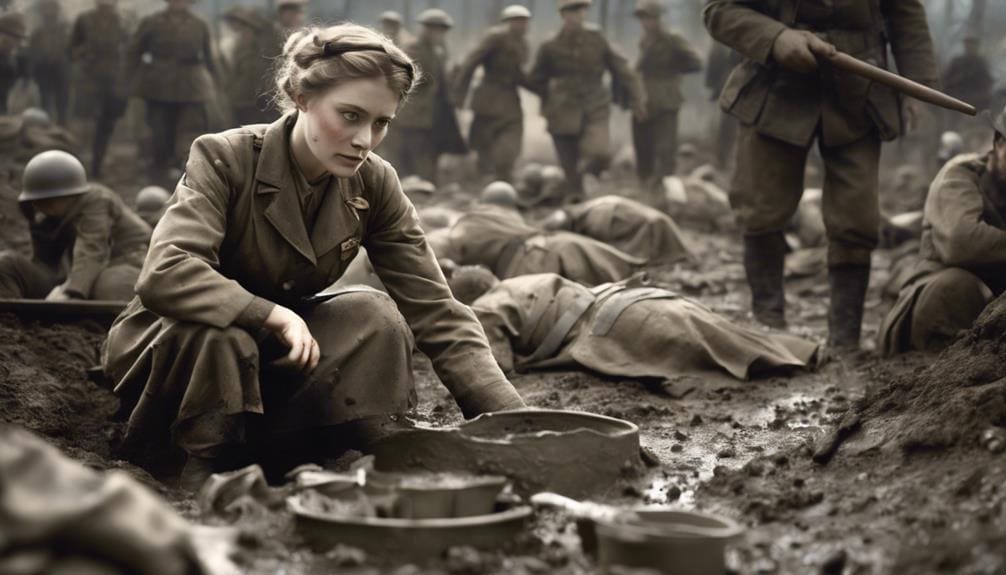
Although many faced challenging challenges during World War I, Elsie Maud Inglis's establishment of the Scottish Women's Hospitals for treating troops in Serbia and Russia stands as a proof to her unparalleled dedication and pioneering spirit in the field of medicine. As a qualified surgeon, Inglis didn't just break barriers; she shattered them. Her work in Serbia was so impactful that she became the first woman awarded the Order of the White Eagle, Serbia's highest honor.
You can imagine the grit it took to set up hospitals in war-torn areas. Inglis didn't let societal norms stop her; she spearheaded a movement that allowed women to serve near the front lines. Her Scottish Women's Hospitals not only provided vital medical care but also showcased women's capabilities in a male-dominated field.
However, Inglis's remarkable journey wasn't without its hardships. After the Russian Revolution in 1917, she was evacuated, only to succumb to cancer upon her return to England. Yet, her legacy endures. Elsie Maud Inglis remains a symbol of bravery and humanitarianism, her contributions during WWI remembered and revered.
Director Dame Katharine Furse
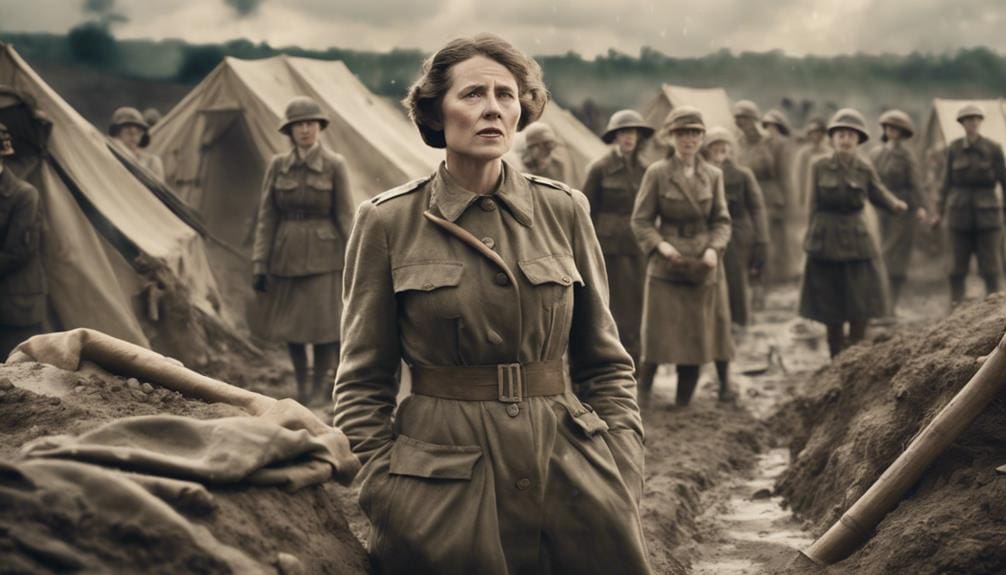
Amid the chaos of World War I, Director Dame Katharine Furse emerged as a pivotal leader, heading the first Voluntary Aid Detachment (VAD) unit in France in 1914 and later steering the Women's Royal Naval Service with unparalleled dedication. Her journey began with organizing VAD units, where she demonstrated exceptional organizational skills and a deep commitment to care amid the war's brutality.
When she shifted to lead the Women's Royal Naval Service in 1917, her strategic vision and leadership transformed it into a critical component of the war effort. Furse's leadership wasn't just about managing logistics; it was about harnessing the potential of women in unprecedented roles, ensuring their contributions were indispensable.
Her recognition with the GBE award underscores her exceptional impact. By championing women's contributions during WWI, she not only addressed immediate wartime needs but also paved the way for future generations of women in military service.
In understanding her role, you're seeing how Furse's influence extended beyond the immediate war years, reshaping societal norms and expectations of women. Her legacy is a testimony to strategic vision, resilience, and unwavering dedication.
Women's Military Contributions
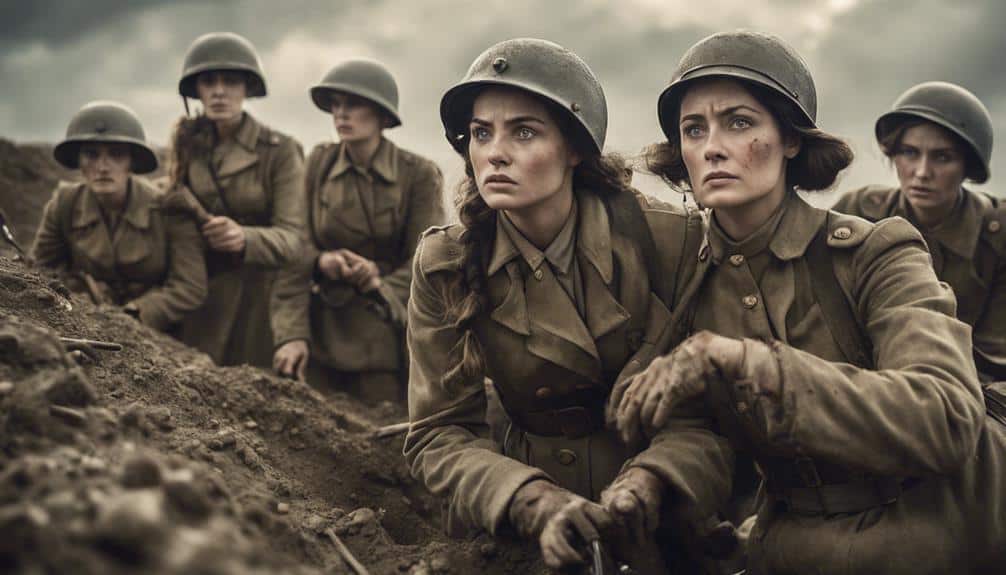
Building upon the foundation laid by leaders like Dame Katharine Furse, women's military contributions during World War I extended through the heroic efforts of individuals such as Elizabeth Knocker, Mairi Chisholm, and Elsie Maud Inglis, who each played critical roles near the front lines and beyond.
Elizabeth Knocker and Mairi Chisholm set up First Aid Posts near the front lines, treating wounded soldiers and providing essential medical care under perilous conditions. Their work not only saved lives but also demonstrated the critical role of women in the war effort.
Elsie Maud Inglis founded the Scottish Women's Hospitals, which provided medical services to troops in Serbia and Russia. Her initiative highlighted how women's contributions were indispensable to the Allied Forces.
Moreover, Mary O'Connell Bianconi's bravery as a driver in an Ambulance Convoy earned her the Military Medal, showcasing women's courage and resilience in direct support roles.
Marguerite Maud McArthur's work as a translator in the War Office and Army Educational Service underscores the diverse capacities in which women served.
Together, these women exemplify the multifaceted roles women played in World War I, demonstrating their unwavering commitment and invaluable contributions to the Allied war effort.


